How the Tuscan fantasy was rewritten by a holiday giant
Package-holiday behemoth TUI has embarked on one of Italy's biggest tourist developments – right in the heart of Chiantishire. Don't worry, says William Cook, it's all done in the best possible taste
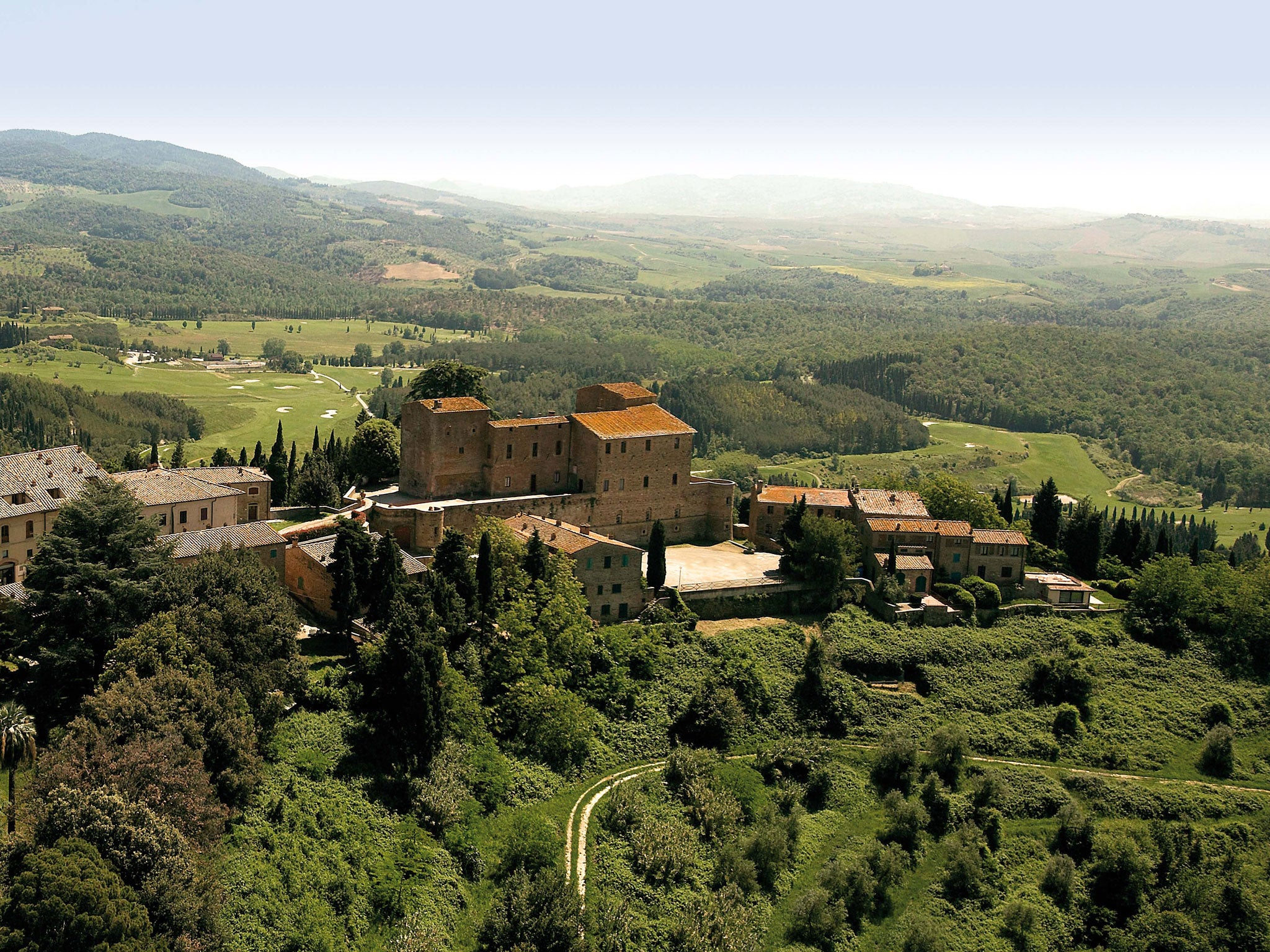
Your support helps us to tell the story
From reproductive rights to climate change to Big Tech, The Independent is on the ground when the story is developing. Whether it's investigating the financials of Elon Musk's pro-Trump PAC or producing our latest documentary, 'The A Word', which shines a light on the American women fighting for reproductive rights, we know how important it is to parse out the facts from the messaging.
At such a critical moment in US history, we need reporters on the ground. Your donation allows us to keep sending journalists to speak to both sides of the story.
The Independent is trusted by Americans across the entire political spectrum. And unlike many other quality news outlets, we choose not to lock Americans out of our reporting and analysis with paywalls. We believe quality journalism should be available to everyone, paid for by those who can afford it.
Your support makes all the difference.It's enough to make Britain's chattering classes choke on their chianti. In the heart of rural Tuscany, amid the vineyards and olive groves, German travel giant TUI (owner of Thomson) is financing one of the biggest tourist developments in Italy. The budget is €250m (£216m). The site is six square miles. They've already built a golf course, a three-star hotel and a range of plush apartments. There are plans for four- and five-star hotels, villas, shops and restaurants. It sounds like every British émigré's worst nightmare, a black comedy by John Mortimer. But the beauty of Castelfalfi is that you hardly know it's there.
Arriving in this medieval village, in the golden triangle between Florence, Pisa and Sienna, you'd scarcely guess you were on a building site. Less than 1 per cent of this 2,700-acre estate is earmarked for construction. The terraced houses on the hillside are being carefully restored. Inside, they're replete with all the latest state-of-the-art appliances. Outside, they're worn and weathered, like part of the natural landscape. In the valley below, derelict farmhouses are being converted into luxury villas. The moneymen are German but the craftsmen are Italian. It could almost be a business model for the cash-strapped Eurozone: Teutonic know-how meets Tuscan style and charm.
Naturally you'll need deep pockets to buy one of these villas or apartments (prices range from €230k/£199k to upwards of €1.2m/£1m) but you don't need to take out a second mortgage to stay in Castelfalfi. Doubles at La Tabaccaia start at €108/£93 per night (€130/£112 in high season) including breakfast. Considering its prime location, close to historic towns such as San Gimignano, it's a competitive price for a smart hotel. The building is an old tobacco factory, and though the interior has been completely renovated, the exterior still looks much like other old-fashioned factories in the region.
Inside, the ambience is warm and welcoming. The decor is plain but pleasant. It only opened a few months ago, but it already feels well established. As you'd expect in a three-star property, the amenities are fairly basic, but the stylish bedrooms feel more akin to a four-star hotel. Across the road, the complex of four swimming pools has recently opened.
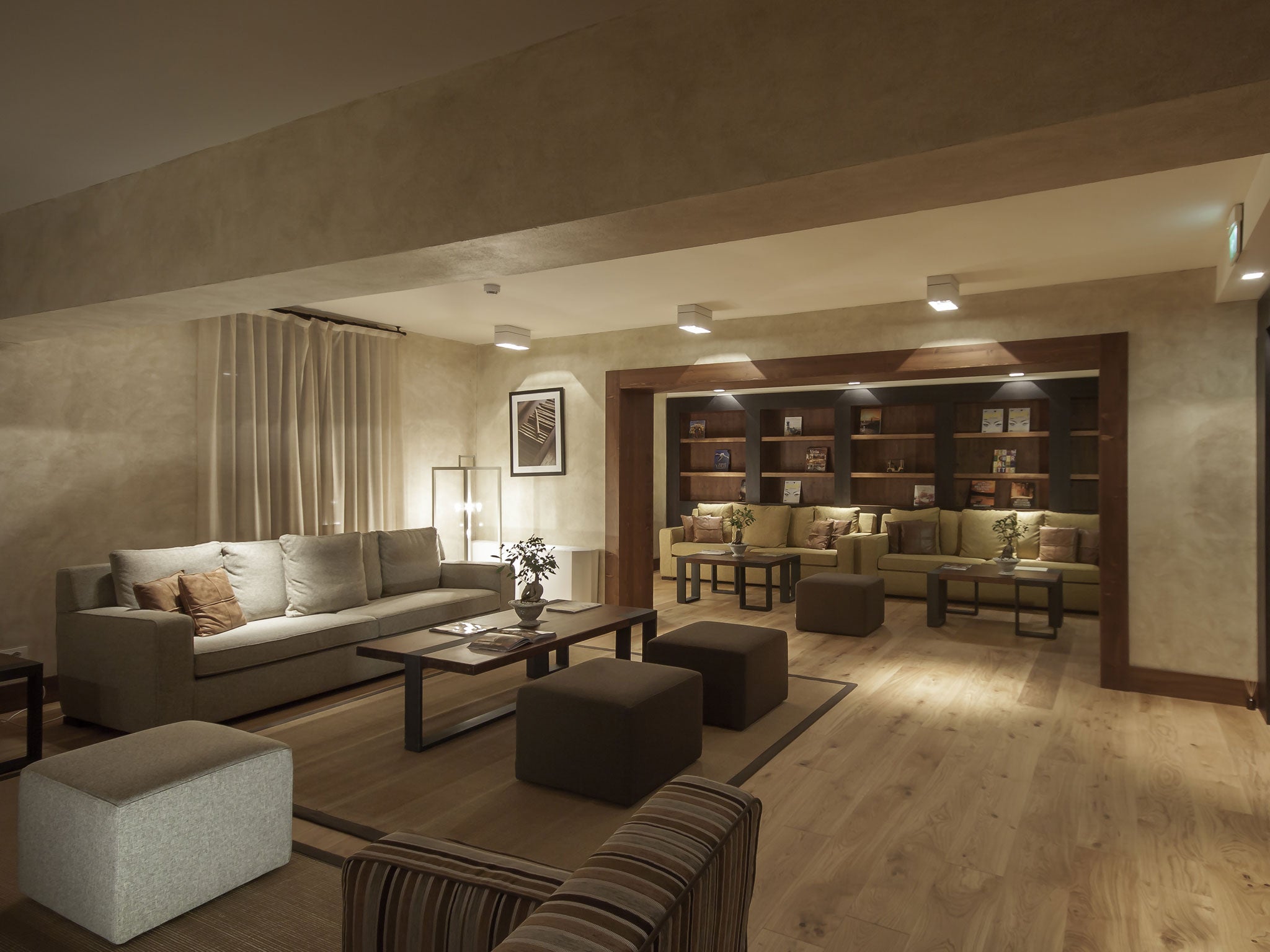
Castelfalfi is still a work in progress: there are cranes among the cypress trees and workmen on site – for the time being. However the golf course (Tuscany's largest) is already up and running and La Tabbaccaia is an ideal base from which to explore the region. Florence is just over an hour away, Pisa is just under – but you could easily spend a week or so nosing around the various villages in the vicinity. Tuscany isn't a place to rush around – it's somewhere to unwind. Virtually every village in the area boasts a homely osteria serving local food and drink. After some salami and cannellini beans, washed down with a few glasses of Montepulciano, you'll find you've reset your body clock to Tuscan time.
Castelfalfi is a microcosm of Tuscany's recent history. When northern Italy industrialised, its tenant farmers left their rented farmhouses and moved to the cities to work in factories. Their hometowns became ghost towns. Eventually, there were only half a dozen people left in Castelfalfi and their abandoned casali fell into disrepair. When TUI bought the estate in 2007, there were 18 of these ruined farmhouses scattered around the estate. Now they're being turned into holiday homes. It's industrialisation's final phase.
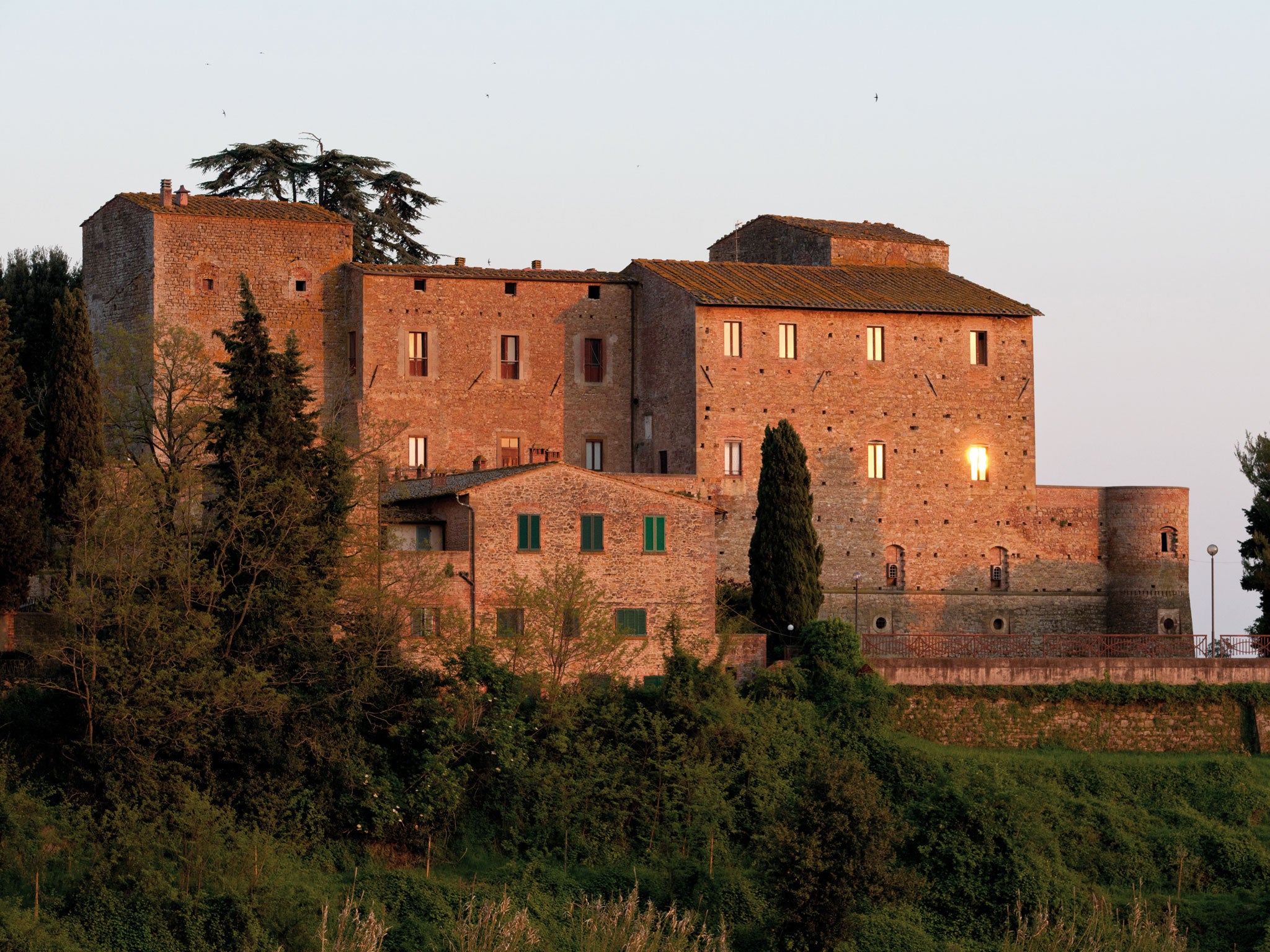
Castelfalfi's crowning glory is the Castello. Once a Medici mansion, you can still see the coat of arms above the door. Eventually, this castle will become a deluxe restaurant. For the time being, it's still a hollow shell. Standing on the battlements, the rolling countryside stretches on forever, like the backdrop to a Renaissance painting – I've never seen so many different shades of green. I could see why so many British people fall in love with Tuscany and come to see it as their second home.
"After the Second World War, the workers fled the countryside," explained Giancarlo Ercolin, general manager of La Tabaccaia, over a glass of wine at the hotel. "The rural areas were almost forgotten." British travellers plugged the gap, buying up their forsaken houses. "They came here because they wanted the Tuscan lifestyle – the peace, the tranquillity." Now TUI is doing the same thing, albeit on a bigger scale. The main challenge is to make sure Castelfalfi doesn't become a theme park. "Our credo is to remain authentic," he told me. Will his colleagues manage it? Only time will tell.
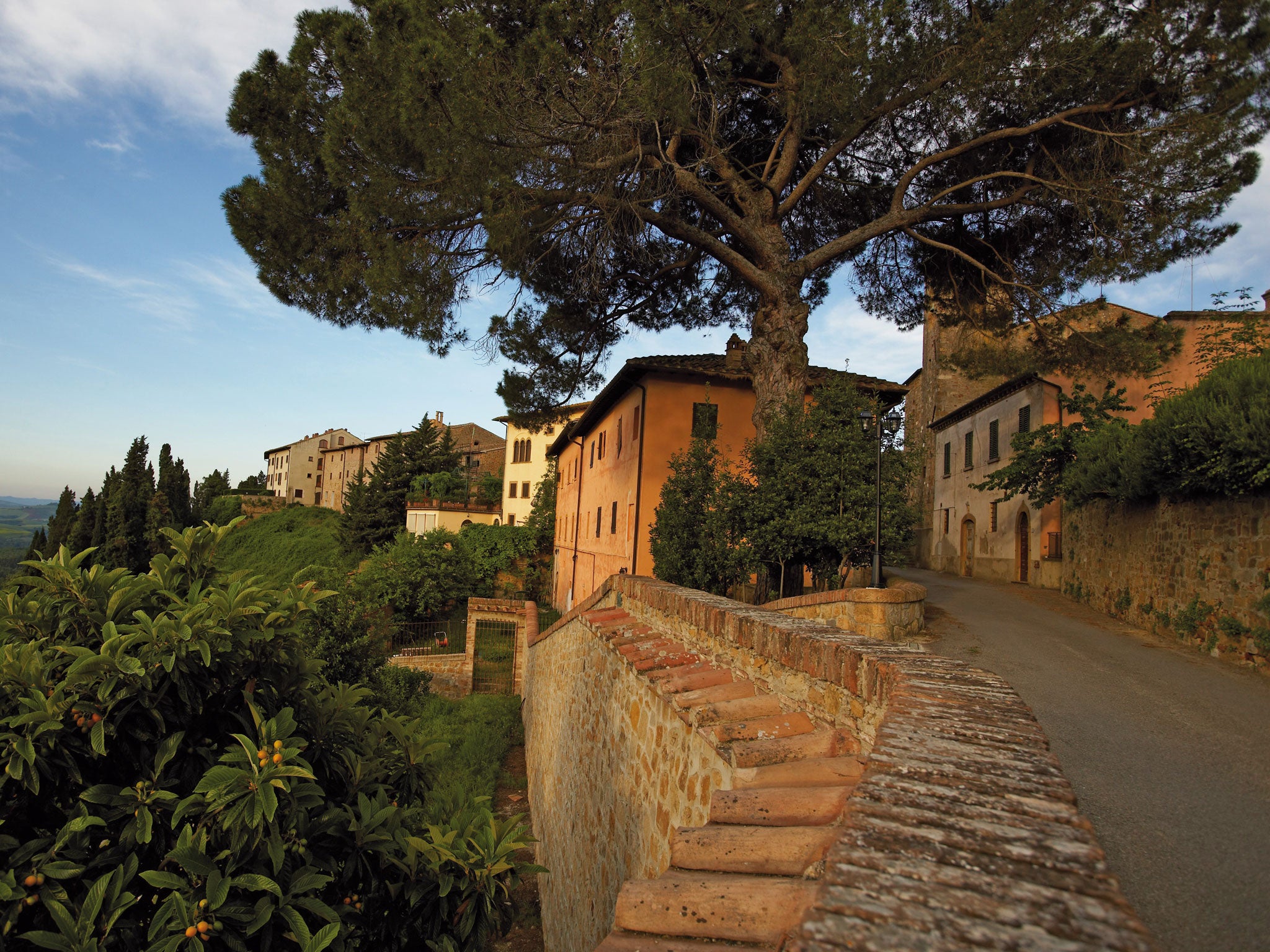
In the evening, I met Stefan Neuhaus, Castelfalfi's energetic German CEO. We drove through lush and verdant valleys to Certaldo, a medieval town 20km away where we ate dinner at an idyllic restaurant called La Saletta. We entered through a pastry shop to reach the osteria where the proprietor Giampiero's mother cooks the food. We ate thick cheese and onion soup and wild boar with olives. Stefan clearly loves it here, but he's had to learn a different way of working. "Alles muss in ordnung sein" (Everything must remain in order) is the business mantra in Germany. Here, things move more slowly. Flexibility is the key.
The next morning I met Castelfalfi's gamekeeper, Giovanni. We walked into the woods together, looking for wild boar, but there was plenty more to see. He pointed out some wild mushrooms. In a few weeks, he told me, the forest floor would be covered in them. "In September, I will hunt for truffles," he said, as we beat a path through the thick undergrowth. "Sometimes we hunt at night. It's really beautiful. Silence. Only you and the dog."
We climbed a muddy bank – Giovanni helped me up. At the top, beneath an overhanging boulder, he showed me an Etruscan tomb, over 2,000 years old. The simple interior, carved out of smooth stone, was perfectly preserved. We walked on, in search of those elusive boar. Giovanni found some tracks and droppings, but no sign of the animals themselves. Finally, we saw them. Giovanni handed me his binoculars and guided my gaze across the hillside. There were more than a dozen, some snouting around for food, others basking in the sunshine. It was a thrilling sight, made even more special by the trouble it had taken us to find them.
"Come and see my girl," Giovanni urged. "She's beautiful." I didn't know what he was on about. Was he talking about his girlfriend? Or his daughter? He lead me to a makeshift pen on the edge of the forest. "Sometimes I call her and she comes like a dog. Ghigo!" he beckoned, and a wild boar trotted towards us, huge and hairy, but quite tame. "Lie down!" Giovanni commanded. Ghigo lay down. He scratched her tummy with a stick, which she seemed to enjoy. Giovanni found Ghigo when she was a baby; her mother had been shot by hunters so he'd raised her as a pet. As Ghigo sniffed my hand, through the chicken wire, I felt a bit guilty about the wild boar I'd eaten at La Saletta the night before.
Castelfalfi has its own restaurant, Il Rosmarino, which serves local dishes (including grilled wild-boar chops) and wood-fired pizzas. I dropped in to sample the house wine, which they grow themselves in the fields beyond. There's a subtle white, a workaday red table wine and fine chianti. They also make their own olive oil, which is best sampled on its own with a hunk of fluffy white bread.
Walking back to La Tabaccaia, I passed a big sign, advertising properties for sale. "Sie Sind Hier," it read. "You Are Here." And below that, "Lei Si Trova Qui." The linguistic subtext seemed clear. Castelfalfi is still Italian, but now it's German and English too.
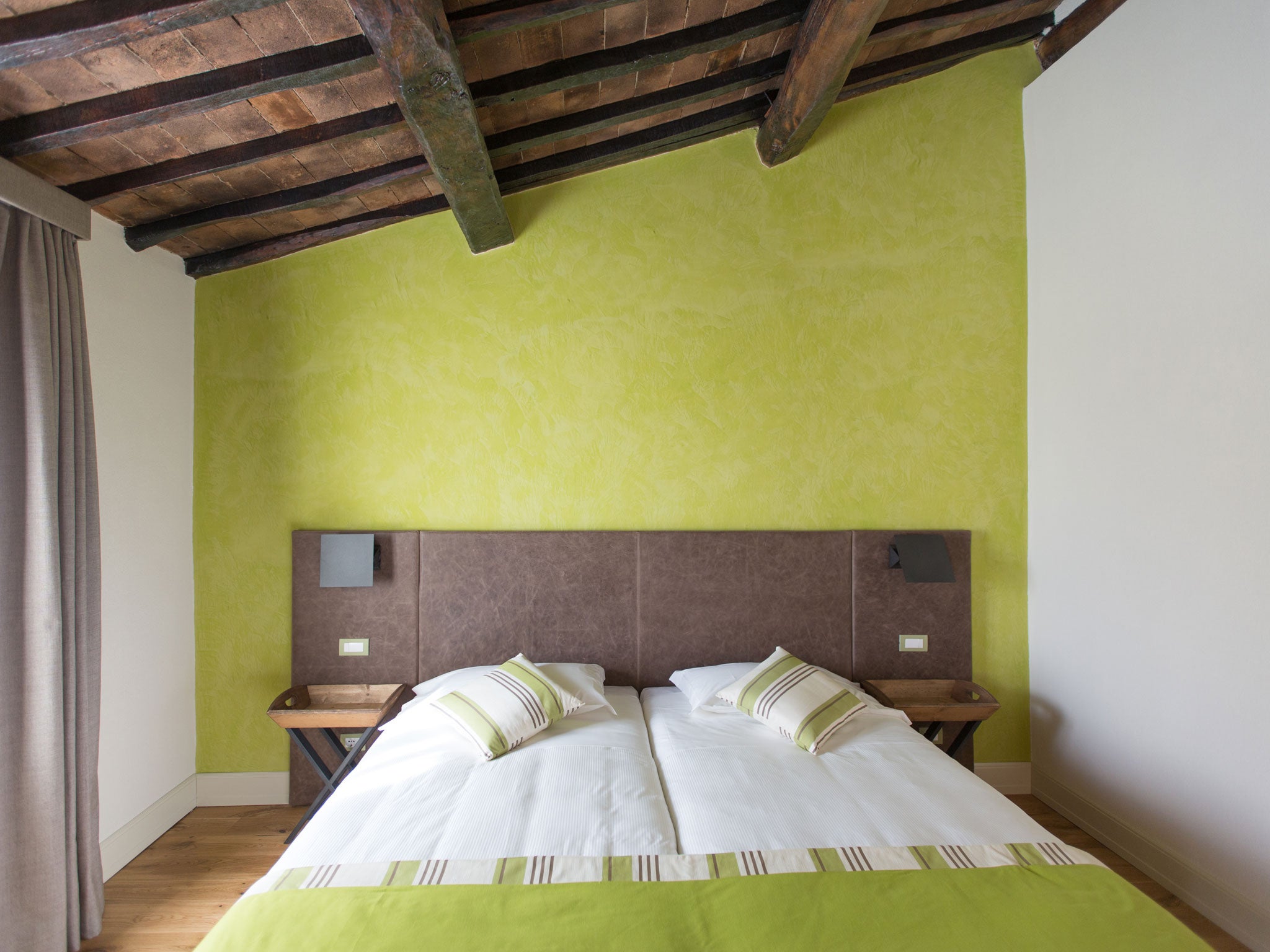
Is Castelfalfi the real Tuscany? Was there ever a real Tuscany? Travellers have always imposed their own preconceptions on this place, ever since the days of the Grand Tour. For tourists, it's always been a fantasy – an idea rather than a destination, an imagined idyll where everything is beautiful, from the weather to the food. As Stefan Neuhaus said: "The region has always been synonymous with a life in Italy that many people dream of." No more – and no less – artificial than any of its touristic predecessors, Castelfalfi is merely the latest attempt to replicate that elusive dream.
Travel essentials
Getting there
Castelfalfi is a 45-minute drive from Pisa Airport, which is served by British Airways (0844 493 0787; ba.com) from Gatwick and Heathrow; easyJet (0871 244 2366; easyJet.com) from Gatwick, Luton and Bristol; Ryanair (0871 246 0000; ryanair.com) from Stansted, Bournemouth, Edinburgh, Glasgow Prestwick, Leeds/Bradford and Liverpool; and Jet2 (0871 226 1737; jet2.com) from Manchester and Newcastle.
Staying there
Hotel La Tabaccaia, Tenuta Di Castelfalfi Spa, Localita Castelfalfi, Montaione, Florence, Italy (00 39 0571 891000; castelfalfi.co.uk). Doubles start at €108 (£93), room only.
More information
Italian Tourist Board: 020-7408 1254; italiantouristboard.co.uk
Join our commenting forum
Join thought-provoking conversations, follow other Independent readers and see their replies
Comments